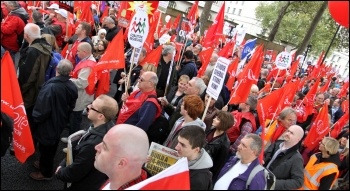To mayor George Ferguson:
When elected you promised a new approach to politics. Just a few months later and the reality is disappointingly familiar. The £35m of cuts in your budget will mean jobs lost and services under attack. Community transport and children’s centres are just two of things that will be hit. You’ve raised council tax by 2%, faster than wages and benefits are rising. Making people pay more for less is a kick in the teeth at a time when its getting harder to make ends meet. With another £65m due to be made over the next 3 years Bristol’s services will be butchered unless this assault can be stopped.
We note you have joined representatives of other cities in criticising the government’s cuts to council budgets. We agree, but those words will ring hollow as long as you continue to do the government’s dirty work and pass on the cuts to Bristolians. Ordinary people are sick of being made to pay for the bankers’ crisis and they’re sick of politicians who say one thing and do another.
These cuts are not a force of nature, they can be stopped. They’re being pushed by a Tory government hell bent on making the rich richer and the rest of us worse off. Letters alone won’t sway them from this course, we need a mass campaign to win back the money they’ve stolen from the city. That would be far stronger if you refused to implement the cuts and made the case for protecting our jobs and services. Otherwise the young, elderly and infirm are once again being sacrificed so that the rich and powerful can continue with their gold-plated lifestyles. Making these cuts breaks your promise to ”not leave this city any less but rather greater than I found it.”
We call upon you to throw out this cuts budget and consult on a one based upon what Bristol needs. We call upon anyone with a conscience to refuse to take part in a cuts cabinet.
While these attacks continue the Bristol and District Anti-Cuts Alliance will fight them cuts by every means necessary. We will stand shoulder to shoulder with council employees, trade unions and service users. There will be no hiding places for the cutters, as we expose the true effects of your damaging vandalism through a relentless series of lobbies, demonstrations and direct actions.
No to all cuts to jobs and services!
The statement was moved in the council chamber by BADACA’s Tom Baldwin.
Questions to the mayor were also submitted by others including Bristol City Unison’s Branch Secretary, Steve Mills and various councillors.
In a show of arrogant disregard for the democratic process, mayor Ferguson questioned the mechanism by which members of the public, pressure groups & even elected councillors can question the mayor & the cabinet…
LibDem councillor, Gary Hopkins asked:
“Have you decided to stop giving responses to Cllrs and members of the public who put in statements or will you continue with the previous practice?”
To which the mayor replied:
“This is semantic quibbling and is not a good use of anybody’s time, and I’d ask you yet again to think carefully about how you use the question system to ask me about matters of policy rather than abusing it by making partisan points…”
Steve Mills of Unison asked a series of perfectly legitimate questions on behalf of his members, many of whom are facing redundancy under Ferguson’s swingeing cuts. However Ferguson in his responses attacks Steve & his members saying things like:
“You ask nine questions disguised as one in a manner that does not fill me with confidence that you mean to work co-operatively as I would have hoped from a responsible trade union. This kind of question brings the system into disrepute…”
“I am unused to this naked political form of questioning that I am sure has nothing to do wit Bristol’s welfare or care of your members and is all to do with Party point scoring in place of responsible involvement.”
And… “I have to say I am certainly not encouraged by the naked political nature of these questions to meet the questioner but I did meet with a dozen or so Trade Union representatives on the very morning I released my budget proposals to begin that very conversation, and we had a constructive discussion of the difficult circumstances which we find ourselves in.”
Clearly, Ferguson as an ‘independent’ considers himself above politics and is only interested in engaging with the confused and the obsequious. This will only encourage BADACA supporters and local unions to do all in our power to defeat these vicious cuts!
http://www.bristolanticutsalliance.org.uk/2013/01/24/questioning-fergusons-cuts/

